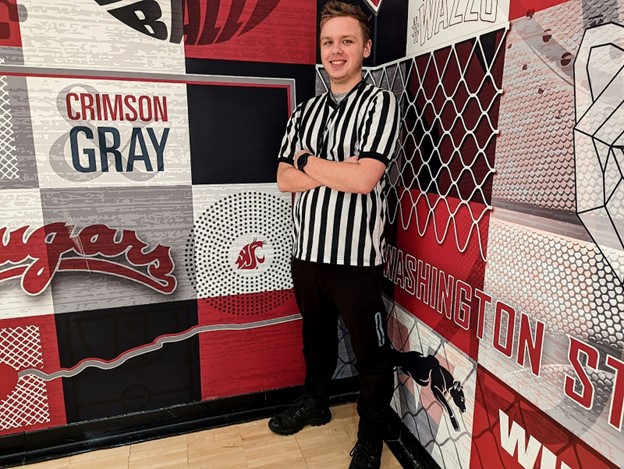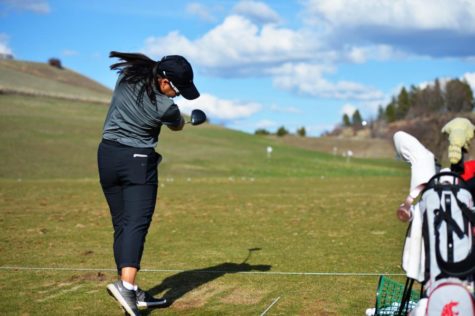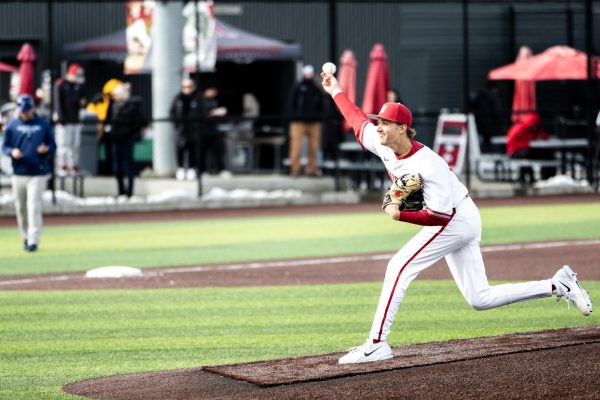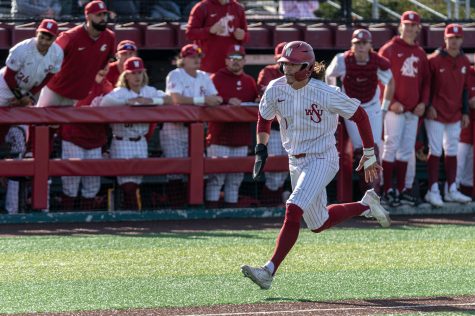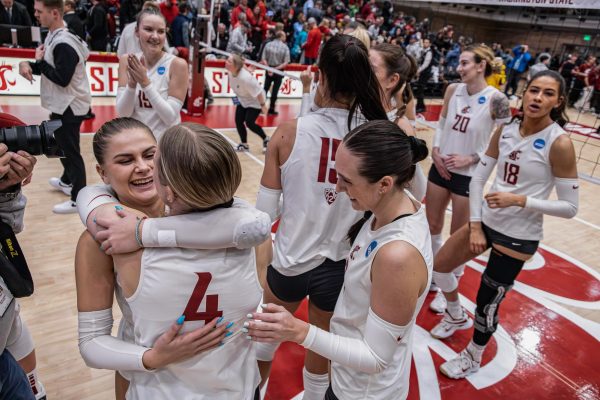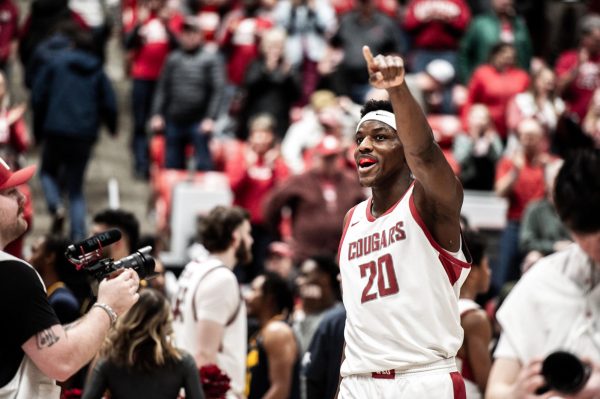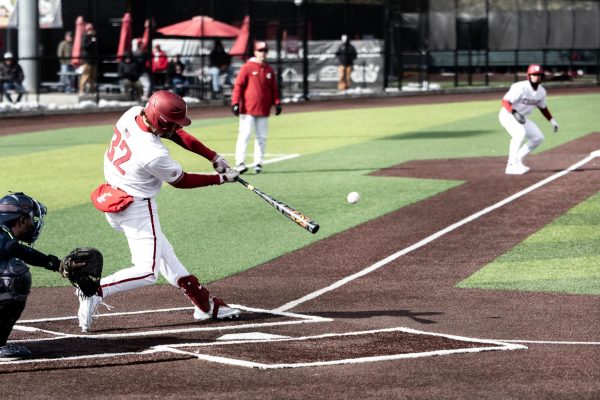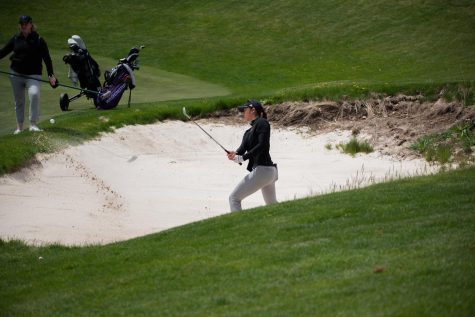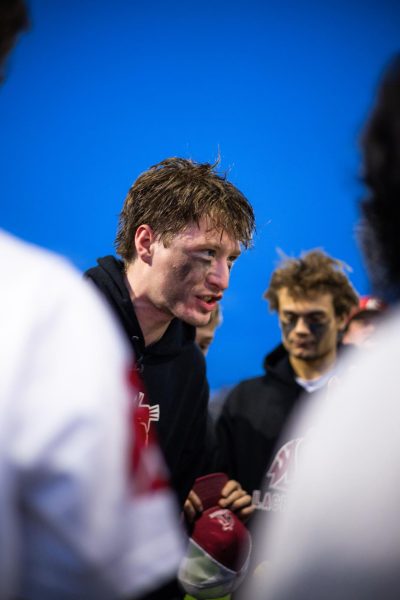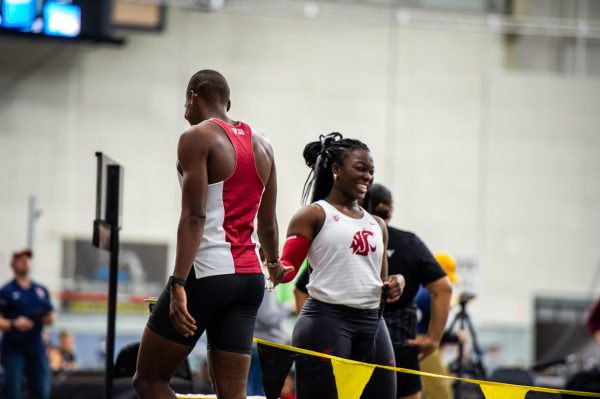Where’s the love? WSU student referee to rep West Coast
Nyhusmoen to travel to Missouri to officiate regional tournament
Zachary Nyhusmoen will represent WSU and schools across the west coast at the Region IV National Intramural and Recreational Sports Association Regional Basketball Tournament Feb. 17–19 in Columbus, Missouri.
February 17, 2023
Zachary Nyhusmoen will represent WSU and schools across the west coast at the National Intramural and Recreational Sports Association Regional Basketball Tournament for Region IV over the weekend in Columbus, Missouri, not as a player, but as an official.
Nyhusmoen, a sophomore mechanical engineering major and supervisor for the competitive sports department, enjoys being an official.
Nyhusmoen called it fun.
Officiating is not easy and those that do it often do not get the credit they deserve.
Take the Super Bowl for instance. The most prominent names of the game headline the match, and some of the most influential people in pop culture participate in the ads during game breaks and perform music at halftime.
With all that, could you name one of the officials? Do you know the eight guys in the black and white stripes that throw the flag or “relay the ruling on the field?” If you could, even though they were announced right before kick-off and again during the game, you would only make up a minuscule portion of the fanbase that was tuned in on Sunday.
Even now, if you go and try to Google their names, you’ll probably have to dig past a couple of news articles about some of their “missed calls” or negative op-eds about their performance Sunday.
So, why officiate at all? This question was asked to both Kylar Hunt and Hunter Hartley, co-coordinators of Competitive Sports and Youth programs for University Recreation on the WSU Pullman campus and members of the South Eastern Washington Officials Association. They both feel they are doing a service to the community.
Hunt said it was important to make wsure kids were able to play sports.
Being an official has taught Nyhusmoen teamwork and conflict resolution.
“They’re not mad at you, but mad at the ref and you have to separate that,” Nyhusmoen said.
Nyhusmoen’s supervisor, Hartley, said Campus Recreation comprises different departments (intramurals being one) and NIRSA is just the governing body that oversees all of Campus Recreation nationwide.
NIRSA is broken up into Regions I–VI, with each region hosting a tournament for the four major sports: soccer, flag football, basketball and tennis.
From there, the winning teams go on to the championships for their respective tournaments. For officials, though, that usually manifests itself in an invite by the selection board.
But the one for Region VI, which includes the Pac-12 schools (excluding Colorado), has not had one since the one hosted by Eastern Washington University in 2019, four years ago.
Hunt said he does not see WSU hosting a tournament in the near future.
“It’s just not in the cards. The amount of money we lose running one of those tournaments is a lot. So it’s hard to justify doing them.” Hunt said.
WSU does not have the available court space for tournaments like basketball, Hunt said.
This forces officials like Nyhusmoen to apply for other regional tournaments, like the one 1,600 miles away for Region IV in Missouri, in hopes of furthering their career development but also proving WSU has some of the best when it comes to officiating.
“Zac didn’t know anything about basketball. I could just tell early on that he was putting more effort than anyone else. Now it shows as he’s gotten better through [the last] year and now he’s going to Missouri,” said Nick Patrick, an intern for competitive sports finishing his degree in sport management.
Hunt adds that they view Nyhusmoen as the department’s future and want to invest as much as they can now to have some of his magic rub off in training and on the court for the newer officials.
In 2020, the National Association of Sports Officials conducted a survey that found the median age for a basketball official is 56.
When asked, Hunt and Hartley said the local SEWOA for basketball, was: “around 30-35 [years old]. Which is the youngest in the State” due to the college students they get to participate. SEWOA serves primarily high and middle school contests on the Palouse.
Hunt said the local chain of college students is not from the competitive sports department like it was in years past, something he’s looking to change.
“My goal is to get them to join for the experience … but also get our kids some more money,” Hunt said.
As other high schools in the state fear games getting canceled due to lack of officials, it’s being monitored on the Palouse by SEWOA but doesn’t seem to be a problem, Hunt said.
“It’s just awesome to see students that are part of university recreation just going out there and doing the best they could and getting rewarded with opportunities like Zac is for NIRSA,” said Donavyn Velez-Fucal, UREC student development coordinator.
Nyhusmoen would be OK with becoming an official once he graduates, but recognizes how tall a climb it may be.
“If it works out that way, I wouldn’t be mad, but it’s not like it’s gonna pay my bills. Especially when you’re not at the top of the NBA or like an MLB umpire, you’re not making big bucks at all. You’re kind of grinding your way through,” Nyhusmoen said.
Hunt, Hunter Hartley, Patrick and Velez-Fucal each had one message for Nyhusmoen: “Have fun!”


